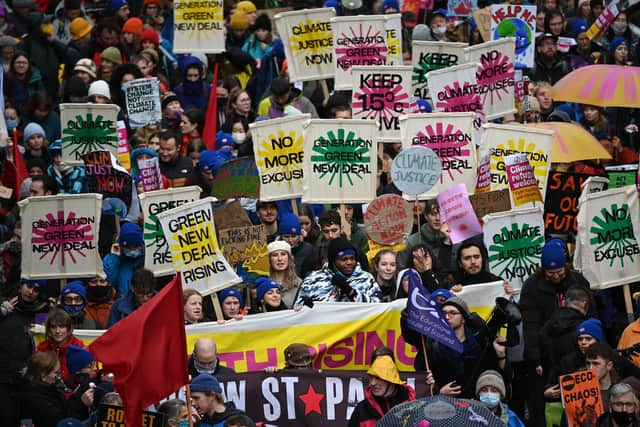Climate change: As Tory leadership race offers little hope, UK experiences weather conditions only recently predicted for 2050 – Martyn McLaughlin
The outcome of the increasingly fractious Tory leadership contest has already used up more than its fair share of temperature-related similes, but the truth is that no matter which of the remaining candidates emerges triumphant, the outcome will be disastrous for the climate.
A year has not passed since the COP26 summit took place in Glasgow, yet already the backlash against net zero has become a new battleground for many Conservatives. Those harbouring ambitions to lead the party are now engaged in a race to the bottom in an attempt to appease a grassroots increasingly populated by sceptics and denialists.
Advertisement
Hide AdAdvertisement
Hide AdWhatever platitudes the contenders might offer up on the environment, the truth can be found in their voting record. As The Scotsman reported earlier this week, the frontrunner for the top job, Rishi Sunak, has almost always voted against measures to combat climate change, rejecting legislation which would cut carbon dioxide emissions of new homes, and giving the thumbs down to a UK-wide decarbonisation target.


Liz Truss, the increasingly embattled Foreign Secretary, has also voted against climate change measures in the Commons, and in a sign of her disregard for the climate emergency, has floated the idea of a temporary moratorium on the green energy levy.
The remaining candidates are arguably even more lamentable. Undaunted – or, as is more likely, entirely unaware – by the prospect of being accused of hypocrisy, Penny Mordaunt has described climate change as an existential threat, while voting against measures to tackle it.
The voting record of Kemi Badenoch, who fell out of the race yesterday afternoon, is even more dismal, and she has dismissed the UK’s net-zero pledge as “unilateral economic disarmament”. At a climate-specific hustings in Westminster on Monday, she appeared to undergo a Damascene conversion, insisting she would not backtrack on the 2050 target. Frankly, there are lions who have made more convincing announcements that they were going vegetarian.
It is clear that whoever inherits the keys to Downing Street will lack the political will to take meaningful action when it comes to the climate crisis. It should go without saying that this is disastrous.
The dangerously high temperatures being seen in the UK are as stark a wake-up call as any that the climate breakdown is already happening, and at a pace few could have predicted.
Only two years ago, the Met Office published a hypothetical forecast in an attempt to spell out the impact of man-made climate change. It described temperatures of more than 36C across swathes of the country, with the mercury exceeding 40C in parts of central and southern England. Meteorologist Aidan McGivern warned of significant travel problems and wider infrastructural stresses as a result of the extreme heat.
The forecast, based on a scenario of continuing high emissions, was for a week in July in the year 2050.
Advertisement
Hide AdAdvertisement
Hide AdBut as it turns out, the predictions are uncannily similar to the real forecast for this week. We are enduring conditions that were thought highly improbable only ten years ago, and suffering under temperatures pinpointed in climate models projected for decades down the line.
If the advent of such extremes is a source of shock, it should not be a source of surprise. The Climate Change Committee, the independent body set up to advise the UK Government, has been warning for years that it is dismally underprepared for the kind of hot weather we are currently experiencing.
Its most recent five yearly assessment, published last year, found alarming evidence that the gap between the level of risk we face, and the level of adaptation underway, has actually widened since 2016, despite the fact the UK has the capacity and resources to respond.
In the past three decades alone, the UK has become 0.9C warmer, and the ten hottest years since 1884 were all recorded over the past 20 years.
Temperatures are rising at pace, and experts believe that the current temperatures will become even more common for our grandchildren and their children.
In a recent study, Dr Nikos Christidis, a climate attribution scientist at the Met Office, made clear that the likelihood of extremely hot days in the UK will continue to rise over the course of the century, with the south-east of England most vulnerable. Such a pattern, Dr Christidis stressed, was the product of man’s impact on the natural world.
“The chances of seeing 40C days in the UK could be as much as ten times more likely in the current climate than under a natural climate unaffected by human influence,” he explained.
“The likelihood of exceeding 40C anywhere in the UK in a given year has also been rapidly increasing, and, even with current pledges on emissions reductions, such extremes could be taking place every 15 years in the climate of 2100.”
Advertisement
Hide AdAdvertisement
Hide AdOther experts believe the occurrences of such high temperatures could be even more frequent by the turn of the century, with Professor Penelope Endersby, chief executive of the Met Office, warning that it could be one in every three years.
Neither prospect is to be relished, but minimising the frequency of extreme weather conditions in the future is in our gift, and dependent on the emissions pathways we take between now and then.
The length of time involved should not lull anyone into a false sense of security, or give rise to the selfish belief that it is a problem for future generations to wrestle with.
Instead, it should inspire a defining generational effort to mitigate the worst impacts of climate change and ensure that emissions are driven down as far as possible. Sadly, achieving such goals depends largely on who enters Downing Street.
Comments
Want to join the conversation? Please or to comment on this article.
